Overview
- Brief Narrative
- Burlap pouch made by 21 year old Masha Wolpe while a prisoner at Stutthof concentration camp from July 1944 to April 1945. The pouch contained Masha’s few possessions – several spools of thread, lipstick, a bar of soap, and combs belonging to her mother and sister. Masha lived with her mother, Sonia, her father, Jacob, her brother, Elisha, and sister, Pearl, in Kovno, Lithuania, where they were part of a large, active Jewish community. In June 1940, the Soviet Union occupied Lithuania and in June 1941, Germany invaded and occupied the nation. By August, the Germans had forced the Jews in Kovno into a ghetto in nearby Slobodka. Within six months of the German occupation, over half of the Jews in Kovno had been murdered. Those who were not killed, including Masha and her family, were utilized for forced labor. Masha married Chone Altmann while living in the ghetto. In July 1944, the ghetto was liquidated and the prisoners were deported to concentration camps in German occupied Poland. Masha, Sonia, and Pearl were separated from Chone, Jacob, and Elisha and taken to Stutthof. Sonia died of typhoid in February 1945. In April, as Soviet forces advanced into Poland, Masha and Pearl were transported away from Stutthof by train and then by barge. They traveled by barge for eight days without food or water. Upon arrival in Kiel, knowing they were surrounded by British soldiers, the German guards forced the remaining prisoners overboard into the Baltic Sea and shot at them. Pearl was killed. Masha escaped and swam to shore where she was rescued by a British soldier. The burlap pouch and its contents were found tied to her wrist. Masha later learned that her husband, father, and brother were all murdered in Dachau concentration camp in 1944 and 1945. With no family remaining in Lithuania, Masha made her way to a displaced persons camp in Italy and later to Paris, where she attended school. In 1950, she obtained her visa and immigrated to the US where she was reunited with her uncle, Julius Wolpe, in Washington, DC.
- Date
-
creation:
after 1944 July-before 1945 April
- Geography
-
use:
Stutthof (Concentration camp);
Sztutowo (Poland)
- Credit Line
- United States Holocaust Memorial Museum Collection, Gift of Masha Wolpe Baras
- Contributor
-
Subject:
Masha Baras
- Biography
-
Masha Wolpe (later Baras) was born on November 20, 1923, in Kovno (now Kaunas), Lithuania. Her father, Jacob Wolpe (b. 1886) was born in Datnow, Lithuania, and her mother Sonia (aka. Scheina) Solski Wolpe (b.1892) was born in Panevėžys, Lithuania, both in the province in Kovno. Jacob had three brothers Heshel (b.1889) and Abram (b.1896) who lived in Kovno, and Julius (b.1890) who immigrated to America in 1907. Masha had an older brother Elisha (aka. Elijasch, b.1918) and a younger sister Pearl (aka. Pera, b.1925). Masha’s father was a prosperous businessman who managed several flax processing factories in the neighboring town of Šiauliai (Shavel in Yiddish). He was a Zionist and the family was part of an active Jewish community. Masha attended a Jewish day school where she learned Hebrew. The family had a large home in Konvo as well as a summer cottage on the coast.
In June 1940, under the terms of the Molotov-Ribbentrop pact, the Soviet Union occupied and annexed Lithuania. Jewish organizations and schools were closed, Jewish property and belongings were confiscated, and many Jews were sent to Siberia to work in labor camps. On June 24, 1941, Soviet forces fled as Germany occupied Kovno. Immediately before and after the occupation, pro-Lithuanian, anti-communist mobs attacked and killed hundreds of Jews, blaming them for the Soviet occupation. In July, German mobile killing units (Einsatzgruppe) began massacring Jews in the forts around Kovno. By mid-August, the Germans concentrated all remaining Jews in a closed ghetto established in Slobodka. Within six months of the German occupation, over half of the Jews in Kovno had been murdered. Those who remained, including Masha and her family, were utilized for forced labor. While living in the ghetto, Masha met and married Chone Altmann.
Masha frequently risked being captured and killed by venturing outside the ghetto walls to barter for food and other items for her family. She was tall with blond hair and a fair complexion that enabled her to pass for German. Masha soon found herself acting as a messenger for the Jewish resistance who were in hiding outside the ghetto. On one occasion, she arrived with a message to find the resistance members surrounded by soldiers. Masha was captured along with the resisters. The soldiers forced her and the other prisoners to dig a trench and proceeded to line them up and shoot them so they fell into the newly dug ditch. The shot fired at Masha missed, but she fell into the trench and pretended to be dead. She waited until the German soldiers left to crawl out and return to the ghetto.
In July 1944, as Soviet forces were approaching Kovno, the authorities deported the remaining Jews in the ghetto to Stutthof and Dachau concentration camps in German occupied Poland. Masha was separated from her husband, father, and brother and was put on a train to Stutthof with her sister and mother. When Masha and her family arrived, any women who had young children were immediately eliminated. Prisoners were forced to line up outside in the elements, sometimes for hours at a time, and were randomly selected to be killed in the gas chamber. Masha, Pearl, and Sonia fell ill during a typhoid fever outbreak at the camp. Masha and her sister, Pearl, nearly died, but managed to recover. Masha’s mother, Sonia, was unable to recover and died in February 1945.
Starting in January 1945, the Germans began transporting the 50,000 remaining prisoners out of Stutthof as Soviet forces advanced into Poland. In April, Masha and her sister Pearl were put on a train and then a barge. They traveled on the barge for eight days without food or water, and many perished on the trip. Upon arrival in Kiel, Germany, knowing they were surrounded by British soldiers, the German guards forced the remaining prisoners overboard into the Baltic Sea and shot at them. Pearl was killed. Masha escaped and swam ashore where she was rescued by a British soldier.
After recovering in a German hospital, Masha tried to return to Kovno. Realizing it was not safe to go back, she made her way to a displaced persons camp in Milan, Italy where she settled and began attending school. Masha found out that her husband, father, and brother had all been murdered in Dachau in 1944 and 1945, not long after being deported. She also discovered that after the deportations, German soldiers burned Kovno Ghetto, and that the thousands of Jews in hiding there were shot or burned to death in the fires. Among those killed were Masha’s uncles, Heshel and Abram, and their families.
While in Italy, Masha met a US soldier who upon hearing how she had lost her family vowed to help her find her uncle, Julius Wolpe, who had immigrated to America. The soldier placed an ad in a NY newspaper and her uncle, who was living in Washington, DC, happened to see it. He telegrammed Masha and asked her to come to the United States. Masha’s intent was to go to Israel, but her uncle convinced her to come to the US first. It took several years before she could obtain a visa and in the interim she attended the Sorbonne in Paris, France, to study foreign languages. In 1950, she arrived in America and was reunited with her uncle. Shortly after her arrival in Washington, DC, she married Raphael Cohen and the couple had a daughter. She worked for the Israeli embassy and the Library of Congress, but spent the majority of her career teaching Hebrew to Jewish children. In June 1980, she remarried Rabbi Joseph Baras and settled in Michigan. Masha Wolpe Cohen Baras, aged 91, passed away on September 18, 2015, in Rockville, Maryland.
Physical Details
- Classification
-
Containers
- Category
-
Bags
- Object Type
-
Pouches (Containers) (lcsh)
- Physical Description
- Rectangular, brown, course woven burlap pouch constructed from three pieces of cloth that are hand stitched with dark green thread forming one horizontal and one vertical seam on the front. At the top is a drawstring closure created by the cloth being folded down and stitched to the interior to form a channel. There are two cloth ties, one 10” and one 3” in length, knotted together and attached to the interior front center of the unlined pouch. There are remnants of a chord in the channel. The seams are loose and frayed and the pouch is worn and caked with dirt. There is a small hole on the back right.
- Dimensions
- overall: Height: 9.625 inches (24.448 cm) | Width: 6.750 inches (17.145 cm) | Depth: 0.500 inches (1.27 cm)
- Materials
- overall : cloth, thread
Rights & Restrictions
- Conditions on Access
- No restrictions on access
- Conditions on Use
- No restrictions on use
Keywords & Subjects
Administrative Notes
- Legal Status
- Permanent Collection
- Provenance
- The pouch was donated to the United States Holocaust Memorial Museum in 1997 by Masha Wolpe Baras.
- Funding Note
- The cataloging of this artifact has been supported by a grant from the Conference on Jewish Material Claims Against Germany.
- Record last modified:
- 2023-05-04 14:38:55
- This page:
- https://collections.ushmm.org/search/catalog/irn12262
Download & Licensing
In-Person Research
- By Appointment
- Request 21 Days in Advance of Visit
- Plan a Research Visit
- Request to See This Object
Contact Us
Also in Masha Wolpe Baras collection
The collection consists of an identification badge and pouch that held seven personal hygiene and sewing items relating to the experiences of Masha Wolpe (later Baras), her mother Sonia, and her sister Pearl while prisoners in Stutthof concentration camp in German occupied Poland during the Holocaust.
Date: 1944 July-1945 April
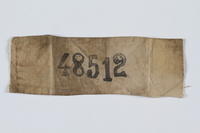
Rectangular Stutthof ID badge numbered 48512 worn by a Lithuanian Jewish inmate
Object
Cloth badge with identification number issued to 21 year old Masha Wolpe while a prisoner at Stutthof concentration camp from July 1944 to April 1945. Masha lived with her mother, Sonia, her father, Jacob, her brother, Elisha, and sister, Pearl, in Kovno, Lithuania, where they were part of a large, active Jewish community. In June 1940, the Soviet Union occupied Lithuania and in June 1941, Germany invaded and occupied the nation. By August, the Germans had forced the Jews in Kovno into a ghetto in nearby Slobodka. Within six months of the German occupation, over half of the Jews in Kovno had been murdered. Those who were not killed, including Masha and her family, were utilized for forced labor. Masha married Chone Altmann while living in the ghetto. In July 1944, the ghetto was liquidated and the prisoners were deported to concentration camps in German occupied Poland. Masha, Sonia, and Pearl were separated from Chone, Jacob, and Elisha and taken to Stutthof. Sonia died of typhoid in February 1945. In April, as Soviet forces advanced into Poland, Masha and Pearl were transported away from Stutthof by train and then by barge. They traveled by barge for eight days without food or water. Upon arrival in Kiel, knowing they were surrounded by British soldiers, the German guards forced the remaining prisoners overboard into the Baltic Sea and shot at them. Pearl was killed. Masha escaped and swam to shore where she was rescued by a British soldier. Masha later learned that her husband, father, and brother were all murdered in Dachau concentration camp in 1944 and 1945. With no family remaining in Lithuania, Masha made her way to a displaced persons camp in Italy and later to Paris, where she attended school. In 1950, she obtained her visa and immigrated to the US where she was reunited with her uncle, Julius Wolpe, in Washington, DC.
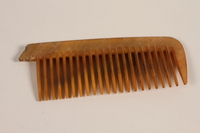
Golden-brown comb owned by a Lithuanian Jewish concentration camp inmate
Object
Comb belonging to the sister or mother of 21 year old Masha Wolpe that she kept in a handmade, burlap pouch while a prisoner at Stutthof concentration camp from July 1944 to April 1945. Masha lived with her mother, Sonia, her father, Jacob, her brother, Elisha, and sister, Pearl, in Kovno, Lithuania, where they were part of a large, active Jewish community. In June 1940, the Soviet Union occupied Lithuania and in June 1941, Germany invaded and occupied the nation. By August, the Germans had forced the Jews in Kovno into a ghetto in nearby Slobodka. Within six months of the German occupation, over half of the Jews in Kovno had been murdered. Those who were not killed, including Masha and her family, were utilized for forced labor. Masha married Chone Altmann while living in the ghetto. In July 1944, the ghetto was liquidated and the prisoners were deported to concentration camps in German occupied Poland. Masha, Sonia, and Pearl were separated from Chone, Jacob, and Elisha and taken to Stutthof. Sonia died of typhoid in February 1945. In April, as Soviet forces advanced into Poland, Masha and Pearl were transported away from Stutthof by train and then by barge. They traveled by barge for eight days without food or water. Upon arrival in Kiel, knowing they were surrounded by British soldiers, the German guards forced the remaining prisoners overboard into the Baltic Sea and shot at them. Pearl was killed. Masha escaped and swam to shore where she was rescued by a British soldier. The burlap pouch and its contents were found tied to her wrist. Masha later learned that her husband, father, and brother were all murdered in Dachau concentration camp in 1944 and 1945. With no family remaining in Lithuania, Masha made her way to a displaced persons camp in Italy and later to Paris, where she attended school. In 1950, she obtained her visa and immigrated to the US where she was reunited with her uncle, Julius Wolpe, in Washington, DC.
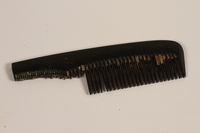
Broken fine tooth comb owned by a Lithuanian Jewish concentration camp inmate
Object
Comb belonging to the sister or mother of 21 year old Masha Wolpe that she kept in a handmade, burlap pouch while a prisoner at Stutthof concentration camp from July 1944 to April 1945. Masha lived with her mother, Sonia, her father, Jacob, her brother, Elisha, and sister, Pearl, in Kovno, Lithuania, where they were part of a large, active Jewish community. In June 1940, the Soviet Union occupied Lithuania and in June 1941, Germany invaded and occupied the nation. By August, the Germans had forced the Jews in Kovno into a ghetto in nearby Slobodka. Within six months of the German occupation, over half of the Jews in Kovno had been murdered. Those who were not killed, including Masha and her family, were utilized for forced labor. Masha married Chone Altmann while living in the ghetto. In July 1944, the ghetto was liquidated and the prisoners were deported to concentration camps in German occupied Poland. Masha, Sonia, and Pearl were separated from Chone, Jacob, and Elisha and taken to Stutthof. Sonia died of typhoid in February 1945. In April, as Soviet forces advanced into Poland, Masha and Pearl were transported away from Stutthof by train and then by barge. They traveled by barge for eight days without food or water. Upon arrival in Kiel, knowing they were surrounded by British soldiers, the German guards forced the remaining prisoners overboard into the Baltic Sea and shot at them. Pearl was killed. Masha escaped and swam to shore where she was rescued by a British soldier. The burlap pouch and its contents were found tied to her wrist. Masha later learned that her husband, father, and brother were all murdered in Dachau concentration camp in 1944 and 1945. With no family remaining in Lithuania, Masha made her way to a displaced persons camp in Italy and later to Paris, where she attended school. In 1950, she obtained her visa and immigrated to the US where she was reunited with her uncle, Julius Wolpe, in Washington, DC.
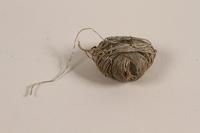
Wound ball of thread used by a Lithuanian Jewish concentration camp inmate
Object
Ball of thread belonging to 21 year old Masha Wolpe that she kept in a handmade, burlap pouch while a prisoner at Stutthof concentration camp from July 1944 to April 1945. Masha lived with her mother, Sonia, her father, Jacob, her brother, Elisha, and sister, Pearl, in Kovno, Lithuania, where they were part of a large, active Jewish community. In June 1940, the Soviet Union occupied Lithuania and in June 1941, Germany invaded and occupied the nation. By August, the Germans had forced the Jews in Kovno into a ghetto in nearby Slobodka. Within six months of the German occupation, over half of the Jews in Kovno had been murdered. Those who were not killed, including Masha and her family, were utilized for forced labor. Masha married Chone Altmann while living in the ghetto. In July 1944, the ghetto was liquidated and the prisoners were deported to concentration camps in German occupied Poland. Masha, Sonia, and Pearl were separated from Chone, Jacob, and Elisha and taken to Stutthof. Sonia died of typhoid in February 1945. In April, as Soviet forces advanced into Poland, Masha and Pearl were transported away from Stutthof by train and then by barge. They traveled by barge for eight days without food or water. Upon arrival in Kiel, knowing they were surrounded by British soldiers, the German guards forced the remaining prisoners overboard into the Baltic Sea and shot at them. Pearl was killed. Masha escaped and swam to shore where she was rescued by a British soldier. The burlap pouch and its contents were found tied to her wrist. Masha later learned that her husband, father, and brother were all murdered in Dachau concentration camp in 1944 and 1945. With no family remaining in Lithuania, Masha made her way to a displaced persons camp in Italy and later to Paris, where she attended school. In 1950, she obtained her visa and immigrated to the US where she was reunited with her uncle, Julius Wolpe, in Washington, DC.

Tan spool and black loose thread used by a Lithuanian Jewish concentration camp inmate
Object
Thread belonging to 21 year old Masha Wolpe that she kept in a handmade, burlap pouch while a prisoner at Stutthof concentration camp from July 1944 to April 1945. Masha lived with her mother, Sonia, her father, Jacob, her brother, Elisha, and sister, Pearl, in Kovno, Lithuania, where they were part of a large, active Jewish community. In June 1940, the Soviet Union occupied Lithuania and in June 1941, Germany invaded and occupied the nation. By August, the Germans had forced the Jews in Kovno into a ghetto in nearby Slobodka. Within six months of the German occupation, over half of the Jews in Kovno had been murdered. Those who were not killed, including Masha and her family, were utilized for forced labor. Masha married Chone Altmann while living in the ghetto. In July 1944, the ghetto was liquidated and the prisoners were deported to concentration camps in German occupied Poland. Masha, Sonia, and Pearl were separated from Chone, Jacob, and Elisha and taken to Stutthof. Sonia died of typhoid in February 1945. In April, as Soviet forces advanced into Poland, Masha and Pearl were transported away from Stutthof by train and then by barge. They traveled by barge for eight days without food or water. Upon arrival in Kiel, knowing they were surrounded by British soldiers, the German guards forced the remaining prisoners overboard into the Baltic Sea and shot at them. Pearl was killed. Masha escaped and swam to shore where she was rescued by a British soldier. The burlap pouch and its contents were found tied to her wrist. Masha later learned that her husband, father, and brother were all murdered in Dachau concentration camp in 1944 and 1945. With no family remaining in Lithuania, Masha made her way to a displaced persons camp in Italy and later to Paris, where she attended school. In 1950, she obtained her visa and immigrated to the US where she was reunited with her uncle, Julius Wolpe, in Washington, DC.
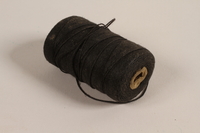
Spool of black thread used by a Lithuanian Jewish concentration camp inmate
Object
Spool of black thread belonging to 21 year old Masha Wolpe that she kept in a handmade, burlap pouch while a prisoner at Stutthof concentration camp from July 1944 to April 1945. Masha lived with her mother, Sonia, her father, Jacob, her brother, Elisha, and sister, Pearl, in Kovno, Lithuania, where they were part of a large, active Jewish community. In June 1940, the Soviet Union occupied Lithuania and in June 1941, Germany invaded and occupied the nation. By August, the Germans had forced the Jews in Kovno into a ghetto in nearby Slobodka. Within six months of the German occupation, over half of the Jews in Kovno had been murdered. Those who were not killed, including Masha and her family, were utilized for forced labor. Masha married Chone Altmann while living in the ghetto. In July 1944, the ghetto was liquidated and the prisoners were deported to concentration camps in German occupied Poland. Masha, Sonia, and Pearl were separated from Chone, Jacob, and Elisha and taken to Stutthof. Sonia died of typhoid in February 1945. In April, as Soviet forces advanced into Poland, Masha and Pearl were transported away from Stutthof by train and then by barge. They traveled by barge for eight days without food or water. Upon arrival in Kiel, knowing they were surrounded by British soldiers, the German guards forced the remaining prisoners overboard into the Baltic Sea and shot at them. Pearl was killed. Masha escaped and swam to shore where she was rescued by a British soldier. The burlap pouch and its contents were found tied to her wrist. Masha later learned that her husband, father, and brother were all murdered in Dachau concentration camp in 1944 and 1945. With no family remaining in Lithuania, Masha made her way to a displaced persons camp in Italy and later to Paris, where she attended school. In 1950, she obtained her visa and immigrated to the US where she was reunited with her uncle, Julius Wolpe, in Washington, DC.
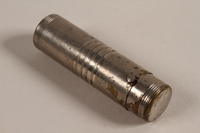
Lipstick tube used by a Lithuanian Jewish concentration camp inmate
Object
Metal lipstick tube belonging to 21 year old Masha Wolpe that she kept in a handmade, burlap pouch while a prisoner at Stutthof concentration camp from July 1944 to April 1945. Masha lived with her mother, Sonia, her father, Jacob, her brother, Elisha, and sister, Pearl, in Kovno, Lithuania, where they were part of a large, active Jewish community. In June 1940, the Soviet Union occupied Lithuania and in June 1941, Germany invaded and occupied the nation. By August, the Germans had forced the Jews in Kovno into a ghetto in nearby Slobodka. Within six months of the German occupation, over half of the Jews in Kovno had been murdered. Those who were not killed, including Masha and her family, were utilized for forced labor. Masha married Chone Altmann while living in the ghetto. In July 1944, the ghetto was liquidated and the prisoners were deported to concentration camps in German occupied Poland. Masha, Sonia, and Pearl were separated from Chone, Jacob, and Elisha and taken to Stutthof. Sonia died of typhoid in February 1945. In April, as Soviet forces advanced into Poland, Masha and Pearl were transported away from Stutthof by train and then by barge. They traveled by barge for eight days without food or water. Upon arrival in Kiel, knowing they were surrounded by British soldiers, the German guards forced the remaining prisoners overboard into the Baltic Sea and shot at them. Pearl was killed. Masha escaped and swam to shore where she was rescued by a British soldier. The burlap pouch and its contents were found tied to her wrist. Masha later learned that her husband, father, and brother were all murdered in Dachau concentration camp in 1944 and 1945. With no family remaining in Lithuania, Masha made her way to a displaced persons camp in Italy and later to Paris, where she attended school. In 1950, she obtained her visa and immigrated to the US where she was reunited with her uncle, Julius Wolpe, in Washington, DC.
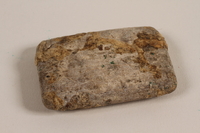
Bar of soap used by a Lithuanian Jewish concentration camp inmate
Object
Bar of soap belonging to 21 year old Masha Wolpe that she kept in a handmade, burlap pouch while a prisoner at Stutthof concentration camp from July 1944 to April 1945. Masha lived with her mother, Sonia, her father, Jacob, her brother, Elisha, and sister, Pearl, in Kovno, Lithuania, where they were part of a large, active Jewish community. In June 1940, the Soviet Union occupied Lithuania and in June 1941, Germany invaded and occupied the nation. By August, the Germans had forced the Jews in Kovno into a ghetto in nearby Slobodka. Within six months of the German occupation, over half of the Jews in Kovno had been murdered. Those who were not killed, including Masha and her family, were utilized for forced labor. Masha married Chone Altmann while living in the ghetto. In July 1944, the ghetto was liquidated and the prisoners were deported to concentration camps in German occupied Poland. Masha, Sonia, and Pearl were separated from Chone, Jacob, and Elisha and taken to Stutthof. Sonia died of typhoid in February 1945. In April, as Soviet forces advanced into Poland, Masha and Pearl were transported away from Stutthof by train and then by barge. They traveled by barge for eight days without food or water. Upon arrival in Kiel, knowing they were surrounded by British soldiers, the German guards forced the remaining prisoners overboard into the Baltic Sea and shot at them. Pearl was killed. Masha escaped and swam to shore where she was rescued by a British soldier. The burlap pouch and its contents were found tied to her wrist. Masha later learned that her husband, father, and brother were all murdered in Dachau concentration camp in 1944 and 1945. With no family remaining in Lithuania, Masha made her way to a displaced persons camp in Italy and later to Paris, where she attended school. In 1950, she obtained her visa and immigrated to the US where she was reunited with her uncle, Julius Wolpe, in Washington, DC.



